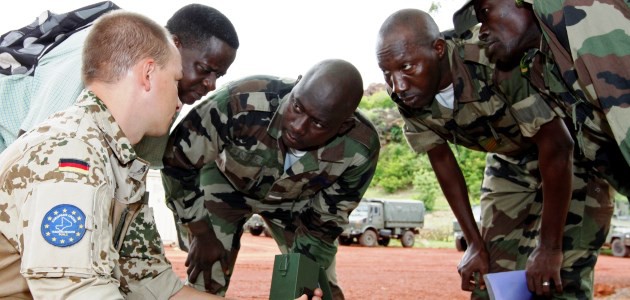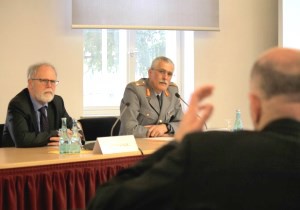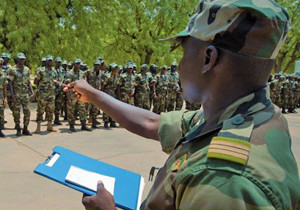Members of the Federal Academy for Security Policy and the Association of Friends of the Federal Academy discussed the Bundeswehr’s training mission in Mali with an expert.

German soldiers of the EUTM Mali train Malian soldiers in the use of metal detectors to identify booby traps (Koulikoro, July 2013). Picture: Bundeswehr/Alyssa Bier
“There is an urgent need in Mali for operational forces that reconnoitre the movements of terrorist groups in this huge country,” said Federal Minister of Defence Ursula von der Leyen at the end of last year as she stated why the Bundeswehr was to step up its commitment in crisis-ridden Mali, a West African country south of Algeria that is almost three and a half times the size of Germany.
On 28 January, the Bundestag passed the resolution to deploy up to 650 German soldiers in support of the United Nations Multidimensional Integrated Stabilisation Mission in Mali (MINUSMA) in addition to the maximum of 350 who already belong to the European Union Training Mission in Mali (EUTM Mali).
When Tuareg rebels and Islamist extremists captured the north of the country in 2012 and the Mali Army imploded, the insurgents could only be contained due to the intervention of French troops in Operation Serval in January 2013 and then forced back in the following months. A possible collapse of the entire state was averted. The situation, however, remained extremely fragile, especially in the north of the country.
This is why MINUSMA has been contributing since April 2013 to establishing safe, secure and more stable conditions in northern Mali. The objective of the other mission – the EUTM Mali – is to rebuild Mali's regular army, which largely collapsed at the time, and raise its level of operational readiness so that it can again ensure order and security throughout the country on its own.

Focus on Africa: The presentation and discussion with Brigadier General Pfrengle are part of the work being done in a new main field of activity at the BAKS: In 2016, the Academy will hold several events addressing conflicts and challenges in the Sahel region. Picture: BAKS/Mochow
In late February, members of the Federal Academy for Security Policy and the Association of Friends of the Federal Academy for Security Policy discussed lessons learned from the European training mission in Mali and challenges associated with it with Brigadier General Franz Xaver Pfrengle, the Chief of Staff at the Eurocorps Headquarters in Strasbourg, who himself was the commander of the EUTM Mali from July to December 2015.
In his introductory presentation, Brigadier General Pfrengle highlighted the fact that the rebuilding of the Malian armed forces was a reform that was being carried out by the Malians, with the Europeans providing support and advice. He said that while helping Malians to help themselves, the mission focused on two fields of activity in which it was doing important groundwork.
In the first field, the provision of training, seven “Groupements tactiques interarmées” (GTIA) have completed several twelve-week courses since 2013 in which they have primarily undergone training in general military tasks, but also in international humanitarian law. These Malian battle groups, each consisting of approx. 800 soldiers, will be more capable of performing important protection and security tasks on the basis of the lessons learned from their operations in the unsettled north of the country.
Brigadier General Pfrengle said that the work in the mission's second field, the provision of advice, which was being done by a 16-man Advisory Task Force, was equally important for the future of the Malian armed forces, but often underrated. He explained that it advised the top-level personnel in the Malian Army with the aim of facilitating the establishment of resilient structures and processes in the Malian armed forces. The passing of a French-style military programme law that contains specific decisions on the buildup and structure of the armed forces was a milestone for Pfrengle.

Train the trainers: The task of the EUTM Mali under the new mandate will be to promote sustained training for Malian forces by Malian forces.
Picture: EUTM Mali
He said that, on the whole, a lot of progress had been made regarding the operational readiness of the Mali Army in the course of the two EUTM Mali mandates to date. He was especially impressed by the desire and willingness of Malian soldiers at all levels to learn and improve the situation.
He said, however, the Malians still did not have sufficient capabilities to, for example, train their own personnel themselves. This was one of the most important reasons for continuing the mission, which was likely to be given a new mandate for another two years, as from May. Pfrengle explained that the EUTM Mali was to adopt an increasingly regional approach and do more to implement the “train the trainer” concept, thus establishing “training qualifications across the country”. Germany also plans to make a substantial commitment to the European mission in the third mandate period, having significantly increased its contribution since mid-2015.
During the ensuing discussion with the attendees, Brigadier General Pfrengle stressed that missions like EUTM Mali were an important building block in the international effort to establish and maintain stability in fragile regions. Alongside the other players in the West African country, the EUTM Mali – and with it Germany – was helping to stabilise a key country in the heart of West Africa and enable security and order for the people to be guaranteed.
Author: Editorial staff
